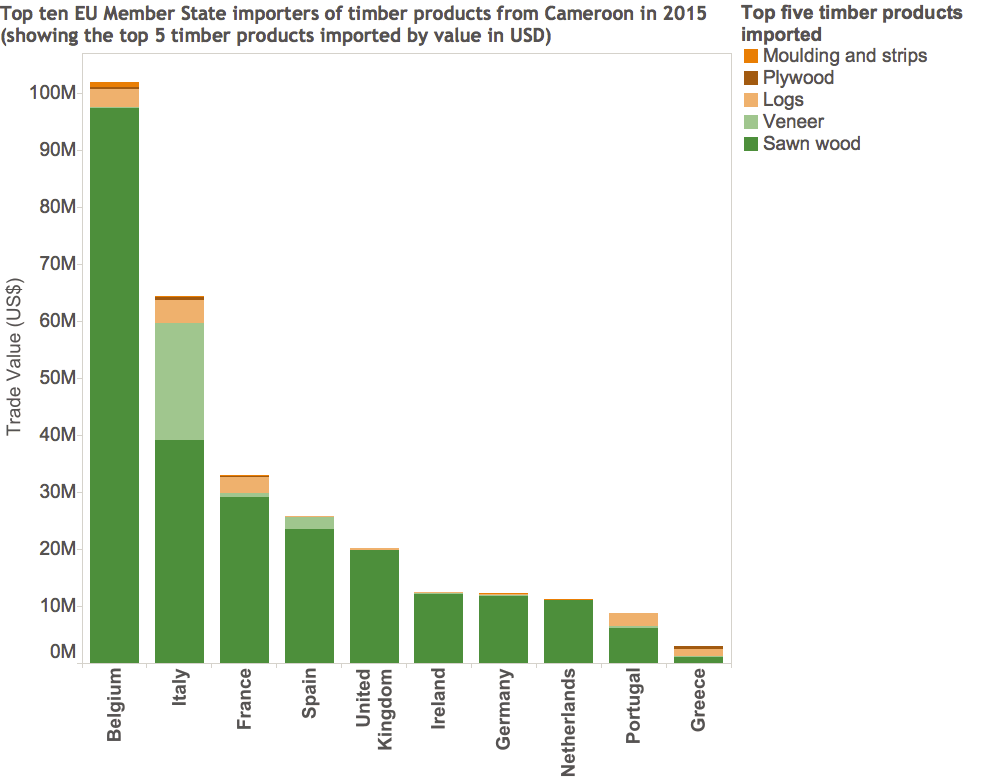An administrative court in the Netherlands last week ruled on an EU Timber Regulation (EUTR) case involving the import of timber from Cameroon.
The case is notable in that, for the first time, a European court has explicitly ruled that Operators in the EU must not only undertake meaningful Due Diligence but must also be able to supply documentary proof of compliance with the EUTR on request. The court concluded that it is not sufficient for Operators to rely solely on government paperwork as evidence of meaningful Due Diligence when importing from countries with significant risk of corruption and documented illegal logging. The judge also ruled that the Dutch EUTR Competent Authority, the Food and Consumer Product Safety Authority (NVWA), was mandated to request that Operators must make available full supply chain documentation including logging permits, transport documents, and financial records associated with timber shipments throughout the supply chain.
The NVWA first filed an injunction in 2016 against Fibois BV in Purmerend, an Operator that was importing timber from Compagnie de Commerce et de Transport (CCT), one of the biggest timber-exporting companies in Cameroon, despite the both Cameroonian Independent Forest Monitor and Greenpeace having identified CCT as dealing in illegally harvested timber in numerous well publicized reports. In 2015, the Netherlands were the 8th-largest importer of Cameroon timber products in the EU; Dutch imports that year were valued at 10,822,926. The 2016 injunction against Fibois put the company on notice that continued imports of wood from CCT would result in a financial forfeit per cubic meter of timber equal to the sale price of the wood. A Forest Trends blog post discussed the details of the original case in March 2016.
When Fibois appealed the injunction, the case was referred to the administrative chamber of a Haarlem court in March 2016. However, no additional financial penalties were attached to this week’s ruling.
The new judgement hinged on whether Fibois BV had adequately undertaken and documented its Due Diligence procedures; particularly in response to the NVWA criticism of missing contractual documents linking the logs that were processed and sold to the trees identified on harvest documents. The court ruled that company claims that an independent auditor had viewed and validated all documents, but not filed copies, was not compliant with the requirements of the EUTR. The court also supported the conclusions of NVWA that the assessment and mitigation of risks that the actual timber imported had been illegally harvested was inadequate. These two steps (risk assessment and mitigation) are required as part of the Due Diligence system set out in the EU Timber Regulation for all companies that place timber on the EU Market for the first time (“first placers”). In this case the importer was unable to show any mitigation of the risk associated with buying from CCT, despite the concerns highlighted in the reports published by the Cameroonian Independent Forest Monitor and Greenpeace.
The court dismissed claims by the Operator that the Dutch Government should have provided more advice on how to undertake Due Diligence and also rejected the assertion that the Dutch EUTR Competent Authority was adding extra requirements to the Timber Regulation.
Additional Resources:
- Dutch court ruling (in Dutch)
- Press release by Greenpeace (in Dutch)

Data from UN Comtrade 2017 and compiled by Forest Trends 2017.
Viewpoints showcases expert analysis and commentary from the Forest Trends team.
Connect with us on Facebook and Twitter to follow our latest work.
